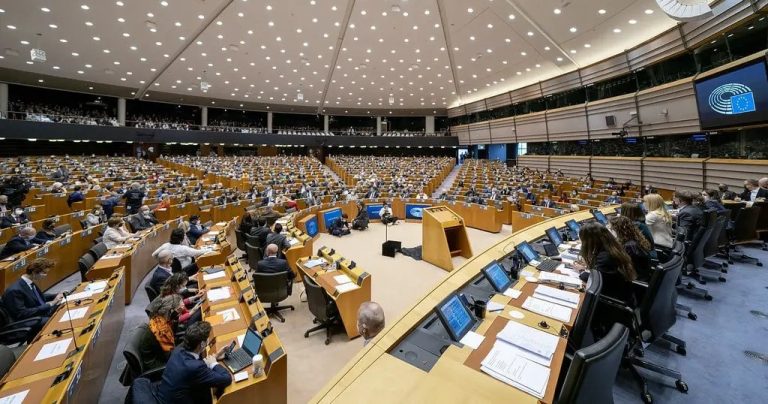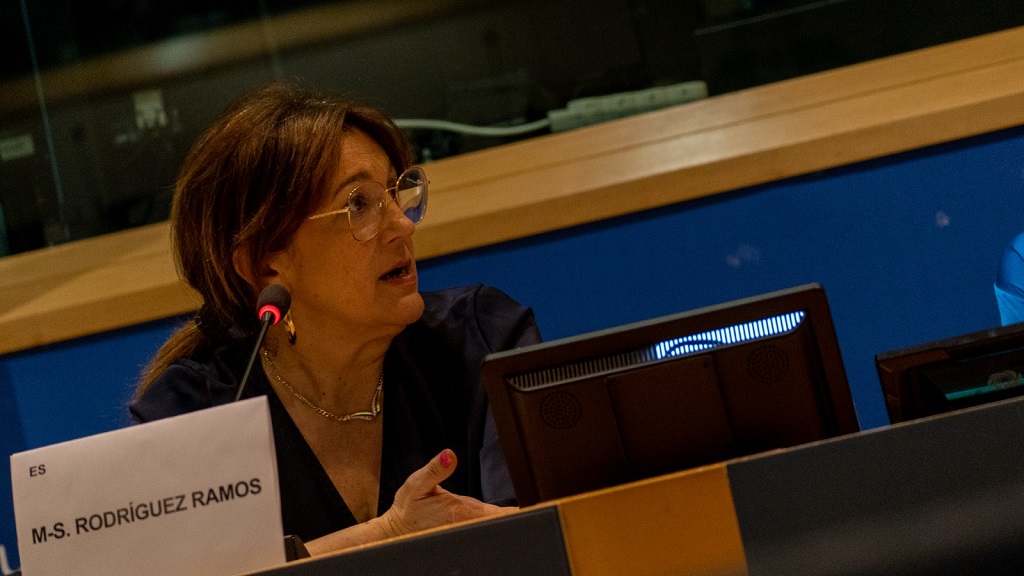19 de junio 2023

Children of Exile: The Births “Sowing Hope” in the Camp of Nicaraguan Farmers

PUBLICIDAD 1M
PUBLICIDAD 4D
PUBLICIDAD 5D
“We need greater international cooperation to break the impunity of the dictator (Daniel Ortega),” says MEP Soraya Rodriguez

A session in the European Parliament plenary at the Strasbourg headquarters in Strasbourg, France. Photo: Archive
A broad majority of legislators of the European Parliament urged the member countries of the European Union (EU) to activate the mechanism of "universal jurisdiction" to investigate and punish crimes against humanity committed by the dictatorship of Daniel Ortega and Rosario Murillo in Nicaragua.
The call was made through a resolution on the situation in Nicaragua, approved by a show of hands in the European Parliament on Thursday, June 15, 2023.
According to the document, MEPs call on “Member States to build on the evidence gathered by the GHREN concerning crimes against humanity committed by the Nicaraguan authorities and to support an end to impunity in Nicaragua, in particular by initiating formal investigations and taking legal action against those responsible through the exercise of universal jurisdiction.”
The Group of Human Rights Experts on Nicaragua (GHREN), in its first report, concluded that Ortega, Murillo, and authorities from at least seven State institutions, led by the Police, have committed crimes against humanity and extrajudicial executions, from 2018 to date.
The GHREN experts - German jurist Jan-Michael Simon and former Colombian prosecutor Ángela María Buitrago - have suggested “activating universal jurisdiction,” a legal mechanism many countries have, to investigate “the violation of rights in other countries.”
At the beginning of last October, in the Comodoro Py, Buenos Aires courts, a criminal investigation was opened against Ortega, Murillo, and other Nicaraguan authorities to determine whether they committed crimes against humanity. Argentina's justice system based the decision on the principle of universal jurisdiction recognized in its Constitution.
In mid-March 2023, Simon explained that “having concluded that the State of Nicaragua” has violated the Convention Against Torture, any country that is a party to the Convention “can sue” the regime before the International Court of Justice (ICC).
In the resolution, MEPs encourage “Member States to bring Nicaragua before the International Court of Justice for violation of the United Nations Convention against Torture and Other Cruel, Inhuman or Degrading Treatment or Punishment, to which Nicaragua is a party”.
This is the ninth resolution voted on by the European Parliament regarding the situation in Nicaragua since 2018; however, it is the first time they exhort countries to activate these international legal mechanisms. In the first five they do not mention them and in the last three they asked “the Member States and the United Nations Security Council, per Articles 13 and 14 of the Rome Statute, to initiate a formal investigation of Nicaragua and Daniel Ortega through the International Criminal Court for crimes against humanity under Article 7 of the Rome Statute.”
The drawback with invoking the Rome Statute, with which the ICC was established, is that Nicaragua is not a signatory to it, so the dictatorship can argue that it does not concern the country.
In an interview with the program Esta Noche, MEP Soraya Rodríguez Ramos commented that all investigations should be supported by the international community, “to bring evidence of the committed crimes of murder, torture, degrading, cruel and inhumane treatment,” which have been verified by the UN group of experts.
“It is an important way to at least stop the repression and be able to redirect this situation,” he said. “We need greater international cooperation to, from my point of view, break the impunity of the dictator.”
The MEP stressed that the approval of a ninth resolution is an unmistakable sign that “Nicaragua is very present in the foreign policy agenda of the European Union.”
"In the European Parliament, there is a very important group of MEPs who are involved and monitoring the situation and evolution of the country. We in the EU and the Parliament made a commitment that Nicaragua would be among the priorities of foreign policy and it is at the international level,” she continued.

The MEPs stressed their call for the European Commission to impose sanctions on Ortega and his closest circle. “It draws attention to the continued instrumentalization of the judicial system and the complicity of judges in this regard; reiterates its request that judges and prosecutors be promptly included in the list of persons sanctioned by the Union,” reads the resolution.
Rodríguez pointed out that “months ago” she sent the EU High Representative for Foreign Affairs, Josep Borrell, “a list with the names of the judges” who stripped Nicaraguan nationality from political opponents. “These judges and prosecutors must be sanctioned.”
“We reiterate that it is necessary to directly sanction the dictator Ortega and the entire political and family network, which sustains the great machinery of repression and corruption that the country has turned into,” stressed the MEP.
The EU has sanctioned 21 high-ranking officials of the dictatorship - including Vice President Murillo - and three entities: the National Police, the Supreme Electoral Council (CSE), and the Nicaraguan Institute of Telecommunications and Post (Telcor). The latest sanctions came on January 10, 2022, in the hours before Ortega and Murillo assumed a new term as president and vice president.
This article was originally published in Spanish in Confidencial and translated by our staff.
PUBLICIDAD 3M
Confidencial es un diario digital nicaragüense, de formato multimedia, fundado por Carlos F. Chamorro en junio de 1996. Inició como un semanario impreso y hoy es un medio de referencia regional con información, análisis, entrevistas, perfiles, reportajes e investigaciones sobre Nicaragua, informando desde el exilio por la persecución política de la dictadura de Daniel Ortega y Rosario Murillo.
PUBLICIDAD 3D